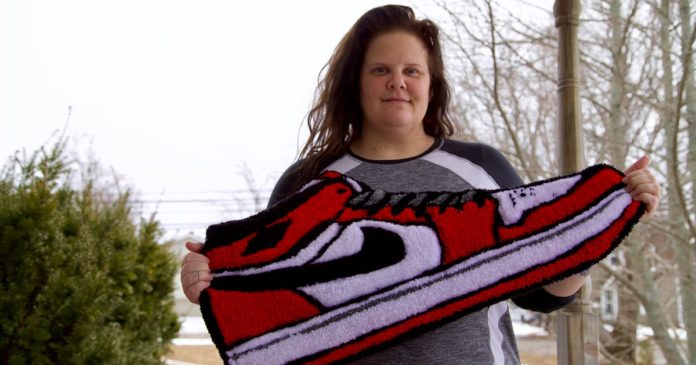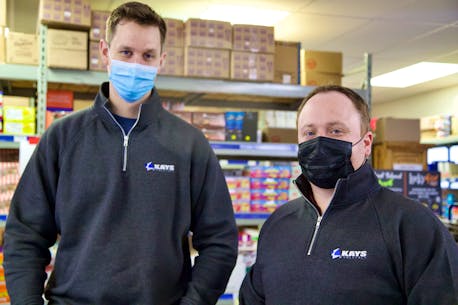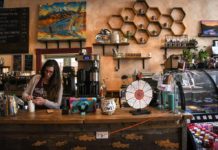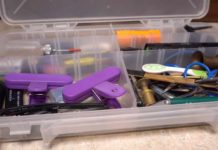CHARLOTTETOWN, P.E.I. — When she was let go from her job in December 2021, Lindsey Mamye needed a new source of income. Her interest was piqued when she saw videos on TikTok and YouTube of people making rugs.
After picking up a tufting machine, a large amount of yarn and tufting cloth and building a wooden frame to work on in her dining room, Mamye said she jumped right into learning how to make rugs.
“It took me a good few months. There is a lot to learn with it,” she said. “The hardest part is really after the rug is done and you have to trim it, carve out the lines, make sure everything is straight and good. It takes some practice.”
In the beginning, Mamye said she would give her rugs away to family and friends as she learned how to make them. She said she only recently started selling them, and has already gotten a handful of orders in.
“The most popular ones by far are the D20 rugs,” she said, referring to the 20-sided dice used in role-playing games. “Almost every message I get is someone looking for one of those.”
While crafting is not new, there seems to have been a recent trend of people turning hobbies into a way to make money — either on the side or as a full-time job.
Mamye took the leap into creative entrepreneurialism due to losing her job, but others are choosing to pursue alternative forms of income as a way to step away from the traditional workspace.
A passion project
Cameron Ross had been a paramedic for 28 years before retiring from the profession. Dealing with anxiety brought on from his time as a paramedic, he knew he had to do something where he could be in control.
In 2014, Ross took his decades long passion of fly fishing and created On the Fly P.E.I., a guided fly-fishing tour service that brings groups fly fishers out to some of P.E.I.’s best fishing holes.
“It went really well for the first few years until COVID-19 hit,” he said.
In 2020, tourism came to a halt on P.E.I., leaving many of Ross’ clients unable to visit. This left Ross yet again thinking of another way to bring in money.
“I’ve always had carpentry experience, I’ve been doing woodworking since 1994,” he said. “So once COVID hit and the tourists kind of went away, I figured I should try to rely on some of my other talents.”
Ross began making custom wooden carvings, specializing in songbirds and other requested carvings. Eventually, he also began making wooden furniture and even renovations.
His new venture, called Cam Crafted, is enough to keep him busy and bring in a bit of cash, but for the most part, it’s a pastime.
“I’m not super busy, but I prefer doing work in the shop than doing renovations and that stuff,” he said. “There is a Facebook page, P.E.I. Crafter’s Online Fair, I put a lot of my stuff on there and have sold quite a bit through them.”
Ross said his carvings range in price depending on the order, but said smaller songbirds typically sell for around $250. However, he said they can also take up to 35 hours to make.
“One of the hard things about custom work is that you are directly competing with mass manufacturing,” he said. “Set up time for equipment almost takes as long as it does to make the product.”

Pandemic crafters
Besides Ross and Mamye, other Islanders have taken on crafting as a way to earn an extra buck, especially since the arrival of COVID-19.
Laurie Carr, co-owner of Red Island Handcrafted, said since the pandemic hit, there has been a spike in the number of people using crafting to make a buck.
“When COVID hit and everyone was home, everyone took up crafting,” she said. “When we started (crafting) in 2019, you might have had a handful of people who had a Cricut machine and doing crafting. Now, it’s like every second person is doing it. It just seems like that was when there was a huge influx of people getting into crafting.”
Carr and her daughter, the other co-owner of Red Island Crafting, left their careers in nursing to pursue crafting full-time after their wooden sign endeavor, Saltwater Design Co., took off in 2019.
The pair’s goal was to have their own storefront, so when that opportunity came, they decided to share it with other Island crafters, said Carr.
“We put out an opportunity for other makers to join us in here. We initially opened with 55 makers, most of them are local, about 90 per cent,” she said. “Now, we are at 110 makers and we still constantly get people coming in to see how they can get their products in our store.”

Long hours
Carr said many see crafting as a way to either develop a successful side business or even allow them to completely give up their traditional job, noting Island crafters are likely split down the middle between full-time crafting and part-time.
However, she said just because it’s different from a traditional job, doesn’t mean it’s easy.
“There is no such thing as a nine-to-five in this business,” said Carr. “If you are going to start out in crafting, be prepared to put in some long hours and to get a lot of feedback, both positive and negative. You need to take it all in stride and work on the suggestions they provide.”
Things to know:
- Lindsey Mamye is in the process of setting up an online store through Facebook. Those interested will be able to find her rugs online at the Tufted Turf Facebook page in the future.
- Cameron Ross sells his carvings and furniture online. His work can be found on his Facebook page – Cam Crafted
- Red Island Handcrafted sells handmade items from P.E.I. and Maritime artists. A look at what they have available can be found at redislandhandcrafted.com
While Carr and Ross were able to turn their hobbies into full-time work, Mamye said she is still looking for another job.
In order to go full-time, Mamye said she would need to make as much as she did while working. However, while she’s out of work, she will keep making rugs in hopes her hobby will take off.
“I would love to get it to the point where I can just do this all day, every day,” she said. “I’m working on getting the Facebook page up and looking at getting a website done. For now, it’s definitely just a side hustle, but I would love to get to the point of doing it full time.”
Cody McEachern is a business reporter with the SaltWire Network in Prince Edward Island.
Twitter.com/CodyInHiFi
Credit: Source link

































